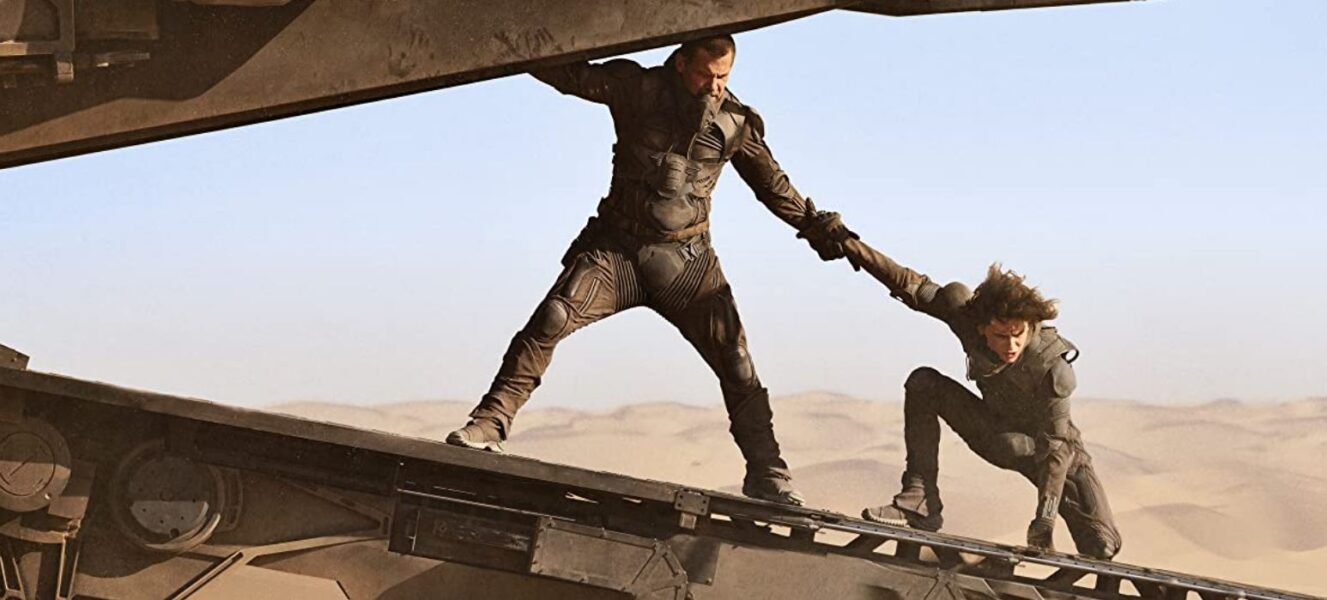| Worth seeing: | for Denis Villeneuve's vision and clarity of complex story-telling but don't expect to get an ending - this is just Part One, with no conclusion yet on the cards |

| Director: | Denis Villeneuve |
| Featuring: | Timothée Chalamet, Zendaya, Charlotte Rampling, Dave Bautista, David Dastmalchian, Jason Momoa, Javier Bardem, Josh Brolin, Marianne Faithfull, Oscar Isaac, Rebecca Ferguson, Sharon Duncan-Brewster, Souad Faress, Stellan Skarsgard, Stephen McKinley Henderson |
| Length: | 155 minutes |
| Certificate: | 12A |
| Country: | Canada, US |
| Released: | 22nd October 2021 |
WHAT’S IT ABOUT?
In the year 10191, Paul (Timothée Chalamet) is being groomed to take over from his father, Duke Leto (Oscar Isaac) as the figurehead of House Atreides – one of the main power brokers of the empire. His mother Jessica (Rebecca Ferguson) is a member of a mystical sisterhood that’s waiting for the arrival of a messiah figure and wondering whether Paul could be the one.
When the Emperor sends Leto to run the desert planet of Arrakis, its previous rulers, House Harkonnen, aren’t prepared to give up control without a fight. And the indigenous Freman population don’t take well to the planet’s new rulers, as they try to protect its main natural resource – a drug known as Spice, which brings life-enhancing hallucinations for some, while being a vital fuel for interstellar travel.
Leto’s main aim is to bring peace to all the Houses, but there aren’t many others who seem to share his goal.
WHAT’S IT LIKE?
It’s not far off four decades since David Lynch’s critically panned attempt to adapt Frank Herbert’s 1965 science fiction epic novel for the cinema; it was regarded as unfilmable then – after Denis Villeneuve’s efforts, perhaps less so.
He’s done a remarkably convincing job of presenting a complex future world with a degree of clarity. There’s a lot to take in, and with that comes a fair amount of exposition, but with its literary provenance, it doesn’t feel too out of place on the big screen.
And the bigger the screen, the better; Villeneuve has shot some – although not all – of this literary adaptation in IMAX, thoroughly immersing you in his majestic vision, with a film that feels as epic as the source material.
Many of the elements of the narrative feel derivative – from the mystical power of “The Voice,” with echoes of the Force from Star Wars, to the Matrix-style prophecy of whether he’s The One, subterranean beasts along the lines of those in Tremors and the invaders mining the natural resources of a foreign land, as in Avatar – but the source material, of course, predates all of those.
Those foreign forces taking over a sandy territory to take control of its fuel production also give it a whiff of topicality that Herbert could not have imagined when he first published, and a relevance that would have eluded Lynch’s effort.
And Villeneuve has perhaps been more disciplined than his predecessor in selecting which elements of the original narrative to tell and knowing what he can’t realistically squeeze into a single feature-length film.
But with such discipline and pragmatism came the need to stretch the novel into two films, as signposted by the “part one” in the opening credits (although not on the poster) and confirmed, frustratingly, by the fact that the story stops rather abruptly after two and a half hours, with no guarantee that it’ll ever be completed.
Two and a half hours is a lot of time to commit when you know you’re not going to get an ending – it would, perhaps, be easier if it wasn’t quite so good – then you wouldn’t care.
